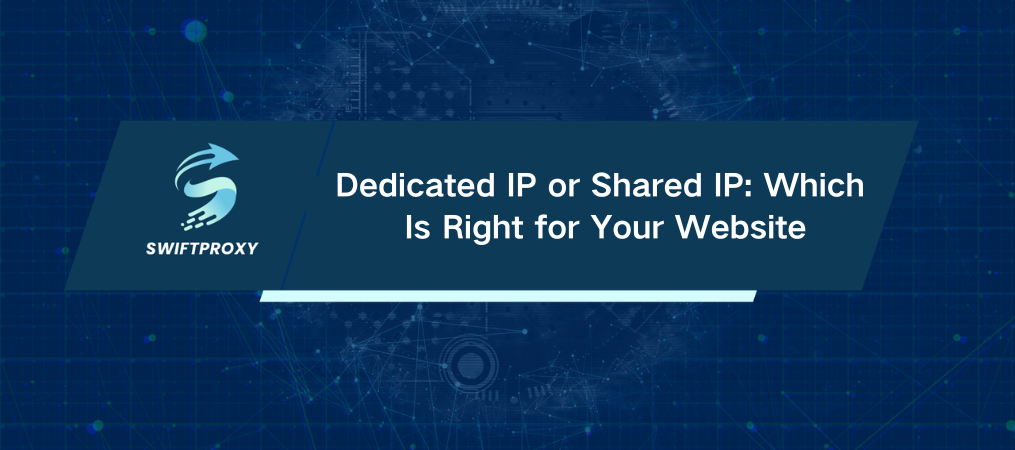Dedicated IP or Shared IP: Which Is Right for Your Website

In recent years, a significant portion of web traffic has been influenced by IP-based security measures. So, how does your website stack up when it comes to IP addresses? Whether you're browsing your favorite websites or sending emails, IP addresses are essential to everything you do online. But when it comes to hosting, the big question is: Dedicated IP or Shared IP?
What is a Website IP Address
In simple terms, a website IP address is a unique numerical label assigned to the server where your website is hosted. It allows your website to be found by devices across the globe. Your Internet Service Provider (ISP) hands it over as a series of numbers separated by periods, and that's how your website gets identified online.
You've likely come across the term "dedicated IP vs shared IP" — but what do these really mean? Let me break it down.
What Does Shared IP Address Mean
A shared IP is like a communal address. It's used by several websites or services running on the same server, often within shared hosting plans. Think of it as splitting an apartment with several roommates – you share the same address but live your own separate lives.
Core Features:
· Cost-effective: Shared IP hosting is ideal for businesses on a budget, such as personal blogs or smaller websites. The lower cost doesn't compromise much on performance if your site's needs are basic.
· Resource Sharing: Just like a shared living space, several websites draw from the same pool of resources – bandwidth, memory, and server space. For smaller sites, this isn't a big deal.
· Security & Management: While cost-effective, sharing resources with others can create security risks. A breach on one site might affect others.
Positives & Negatives:
Go for shared hosting if you're just starting or running a low-traffic site. You'll save money, and it's easy to upgrade when you need more power. But remember, peak traffic times can slow your site down, and a bad neighbor (think: a compromised site) might hurt your reputation, especially with email deliverability.
What Does Dedicated IP Mean
A dedicated IP address is yours and yours alone. Unlike shared IPs, which are used by multiple sites, a dedicated IP is assigned only to you. It's like having your own private address—no roommates.
Core Features:
· Exclusivity: No other site shares this IP, giving you more control and security.
· Boosted Performance: Your site's performance stays stable and predictable, without being affected by the traffic or behavior of other sites on the server.
· Direct Access: You can access your site or server directly without waiting for DNS changes to take effect.
· Enhanced Email Delivery: Since your IP is exclusive, it's less likely to be blacklisted if someone else on your server spams.
· SSL Certificates: Some older systems and applications require a dedicated IP to function correctly with SSL certificates.
· Compliance & Security: Certain industries and regulations require dedicated IPs for compliance, making this option ideal for high-security needs.
Positives & Negatives:
A dedicated IP offers complete control and superior performance. We've always gone with a dedicated IP, especially for email marketing, where reputation is everything. But, of course, the price is higher. And setting it up might require some technical expertise. It's worth it for businesses that need reliable service, but it might not be necessary for smaller websites.
Differences Between Shared IP and Dedicated IP
Here's a quick breakdown of how they compare:
· Management: Dedicated IP = full control. Shared IP = shared control with others.
· Reputation: With a dedicated IP, you own your reputation. With a shared IP, you're at the mercy of others' activities.
· Performance: Dedicated IPs deliver stable performance. Shared IPs are more likely to fluctuate, especially during peak traffic times.
· Cost: The dedicated IP wins on performance, but the shared IP takes the crown for being budget-friendly.
Which Option Is Ideal for Your Website and SEO
If you need robust security, reliability, and consistent performance, a dedicated IP is your best bet. It's perfect for handling sensitive data, regulated industries, or anything where downtime or email deliverability can cost you. But if you're running a personal blog, small business website, or startup, a shared IP can provide an excellent balance between performance and cost-efficiency.
SEO-wise, shared IPs won't hurt you. Search engines care more about content quality and relevance these days. Shared IPs can do the job just fine—provided your host has strong security measures in place.
Conclusion
The decision between dedicated and shared IPs boils down to your needs. Dedicated IPs offer control, security, and superior performance, but at a higher price. Shared IPs are affordable, making them ideal for smaller sites with moderate traffic. Whatever you choose, remember that your IP address is critical, and the right choice can affect your website's performance and security.

















































